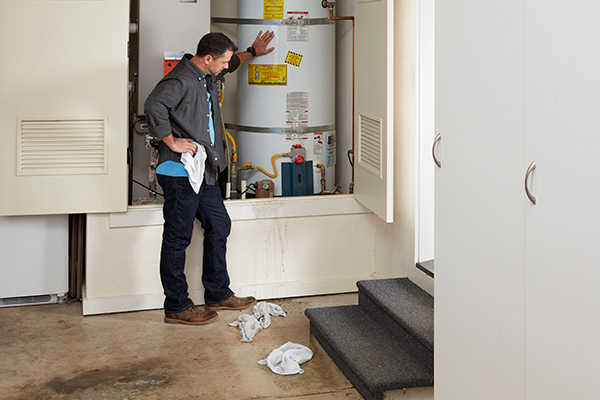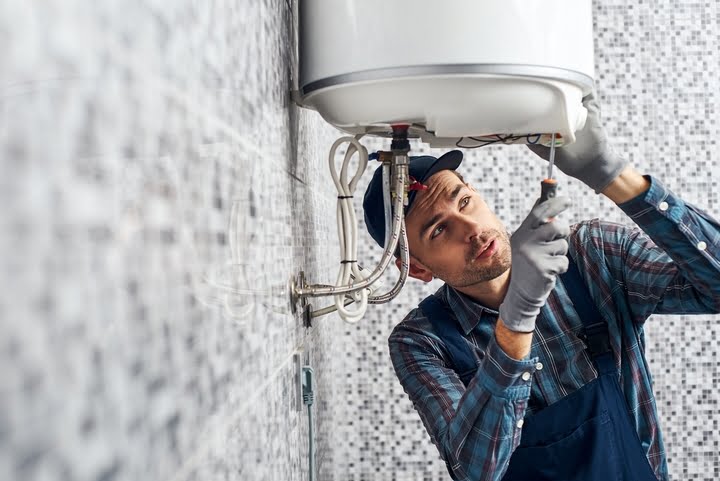The writer is making several great points regarding Maintaining & Draining a Water Heater in general in this article on the next paragraphs.

Whether it lies in the basement or a separate space, busted water heaters can cause stress and anxiety. A conventional device holds 80 gallons, so an over night leak will lead to a flood. This leads to major building damage with soaked wall surfaces as well as floorings. Besides, having no hot water supply is likewise frustrating. If you are taking care of these problems, remember of the following:
Turn Off Power Source
Prior to calling the plumber, closed off a gas water heater by turning the temperature level dial. This will certainly stop electrocution, particularly if there is a leak as water is a conductor. Commonly, the heating aspect shuts off when the water hits a particular temperature.
Cut Off the Cold Water Supply
Cut off the tanks tap water supply from the resource. When your storage tank is in excellent problem, the cool water quits filling up when the tank is complete. If you can not locate it or reach it, you must transform off that main water supply line outside your residential property.
Call the Plumber
After doing the first 2 security actions, you need to call your plumber to find immediately to take care of a burst water heater. Nevertheless, keep in mind that your system will not just conk out substantially overnight. There are usually signs that your aging water heater has sediment build-up in the inside. Take note of the following:
Don't wait for major flooding to call the plumber. Already, you will have to spend even more to recover your residential or commercial property. Rather, as soon as you spot these indicators, have actually an expert concerned examine your hot water heater thank. Commonly, water heaters have a life-span of concerning 8 to 12 years. With normal evaluation and upkeep, you can lengthen its life.
Tidy up Property
After calling the plumber, file damages by making note and also pictures so you can declare your house owner's insurance coverage. From there, start the immediate cleanup. Obtain any type of essential items to avoid further saturating. Then, eliminate any type of standing water to prevent mold and mildew growth. If you have a submersible water pump, use that to drain the water. Or else, the standard bucket approach will additionally function. Attempt to wipe out everything, consisting of walls and also baseboards. If you have an electric follower as well as dehumidifier, maintain them running to keep air distributing. This will help hinder mold and mildew growth.
Bear in mind, if you notice any problems with your hot water heater, call the pros immediately. You can not take this issue gently due to the fact that a damaged thermostat can elevate water temperature to an alarmingly high degree, bring about unintentional burns. A broken heating system pressure relief valve can likewise create an explosion. For ideal outcomes, obtain an annual check so your unit gets evaluated, cleansed, drained pipes, as well as re-filled, ensuring optimal efficiency.
Whether it is located in the basement or a separate area, broken water heating systems can create tension. Before calling the plumber, shut off a gas water heating system by turning the temperature level dial. After doing the initial 2 safety and security steps, you should call your plumber to come right away to deal with a burst water heating unit. If you have a completely submersible water pump, utilize that to drain the water. Keep in mind, if you observe any type of problems with your water heater, call the pros right away.
8 REASONS YOUR HOT WATER HEATER IS NOT WORKING & HOW TO FIX
Water Heater Problems & Solutions
Loose or Damaged In-Line Valve
Unlike a water leak near the bottom of your water tank, a water leak on top of your system can be easily fixed. A common cause of water tank leaks includes a loose in-line valve. This is a handle that is located at the top of the water tank that is engineered to activate or deactivate the flow of water. To fix this problem, you will need to secure the nut that holds the ball or in-line valve in its location. If the leak becomes more severe once it is tightened, you will be required to travel to your local hardware store to purchase a new in-line valve for your water heater.
Damaged Pressure Relief Valve
Most types of water heaters are equipped with a pressure relief valve that is engineered to discharge pressure from the water tank when it becomes too high. If this valve on top of your water heater begins to leak, we recommend purchasing a new one online or from your local store. The process of removing and replacing pressure relief valves is not complicated.
No Warm Water
If you have an electric water heater in your home, the most typical cause of a lack of warm water is a broken heating element. Your water heater is equipped with two heating elements that are tasked with heating incoming water in the water tank. Once a heating element begins to malfunction, you will have little to no hot water to use for showering, cleaning, and laundry.
Low Supply of Hot Water
Are you continuously running out of warm water? This issue may be a byproduct of a cracked dip tube. This tube is engineered to push cold water to the base of your water tank to be heated. Once a crack or hole begins to form in the dip tube, the incoming supply of cold water may be released near the top or middle of your tank. As a result, the cold water on top of the tank will be sent to the faucets and showers in your house. This hot water heater problem can only be fixed by replacing the dip tube on your system. Since the process of installing a new dip tube is complex, we recommend calling a certified technician for help.
A low supply of warm water may also be a signal of excess sediment buildup in your water tank. As your water heater reaches the middle of its life cycle, minerals in water including magnesium and calcium will begin to collect at the base of the water tank. As the minerals continue to grow, there will be less room in the water tank to store hot water. To resolve this problem, flush your water heater to remove the excess minerals.
Water is Too Warm or Cold
If the water in your shower feels uncomfortable hot or cold, you can adjust the temperature of your water by changing the settings on your thermostat. Setting the temperature to 120 degrees Fahrenheit may help you save money on your utility bills. This is an excellent temperature to use if you’re worried about scalding or skin irritation. Does this temperature feel too cold? You may also adjust the thermostat to 140 degrees Fahrenheit to make your showers more pleasant. If your hot water heater is not working when you change the temperature, this is an indicator of a broken thermostat. Immediately find a certified plumbing or heating contractor in your area to repair or replace your thermostat.
Low Water Pressure
Low water pressure is not always caused by a malfunctioning water heater. If you live in an older home with smaller water pipes, the flow of water will be restricted prior to reaching our kitchen or bathroom skins. The only way to eliminate this hot water heater problem is to connect new ¾-inch water lines to your system. Another type of problem that may negatively impact your water pressure includes calcium deposits in water pipes.
As magnesium and calcium begin to form in your pipes, the diameter of your water lines will become smaller. As a result, the warm water from your water heater will not be able to travel in an efficient manner to your sinks or appliances. Since the process of replacing water pipes includes removing drywall, an average homeowner that does not have a plumbing license will not be able to fix this hot water heater problem.
https://www.wmhendersoninc.com/blog/8-reasons-your-water-heater-is-not-working-how-to-fix/

I hope you liked our section on Water Heater Burst. Thanks a ton for taking time to read through our content. Sharing is nice. Helping others is fun. Thanks a lot for going through it.
Book Your Appointment